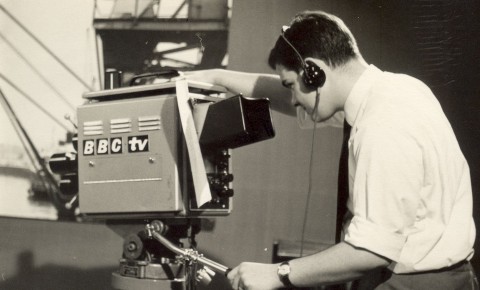Copyright resides with the original holder, no reproduction without permission.
The photo is of Pete Simpkin at the controls of a Marconi vidicon camera, with inbuilt racks controls, at BBC Southampton.
For more information see:
http://www.bbceng.info/Operations/studio_ops/reminiscences/southampton/simpkin1.htm
The following comments were added on the Pebble Mill Facebook group:
Mike Skipper: ‘I don’t think Vidicon cameras would have been used for very long for broadcast – Vidicon tubes had an appalling low light performance (very laggy) and I believe gave a barely acceptable performance when scenes were well lit. I don’t know the times involved but the Plumbicon tube certainly outperformed the Vidicon when it became available… ‘
Pete Simpkin: ‘I agree, but remember these were the days of 405 lines and the whole system was pretty low definition. Also most of the studio shots were static with not too much in vision movement. However we achieved very good pictures in a small studio news environment.Our studio was on air for most of the 60s until 625 arrived.’
Alan Miller: ‘We used EMI 201 Vidicon 625 line cameras in Glasgow Studio B in the 1970’s and they were truly awful. They smeared all over the place especially if you were stupid enough to use a crawling caption across the screen.’
Pete Simpkin: ‘I agree Alan about the picture quality the 201s were never as good as the Marconis actually but they had quieter lens change!’
